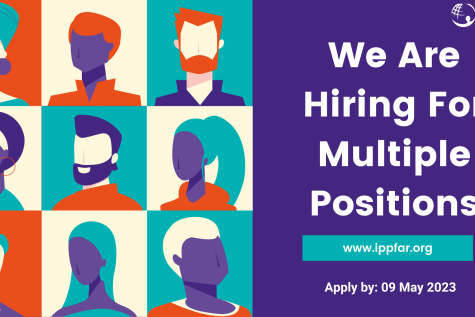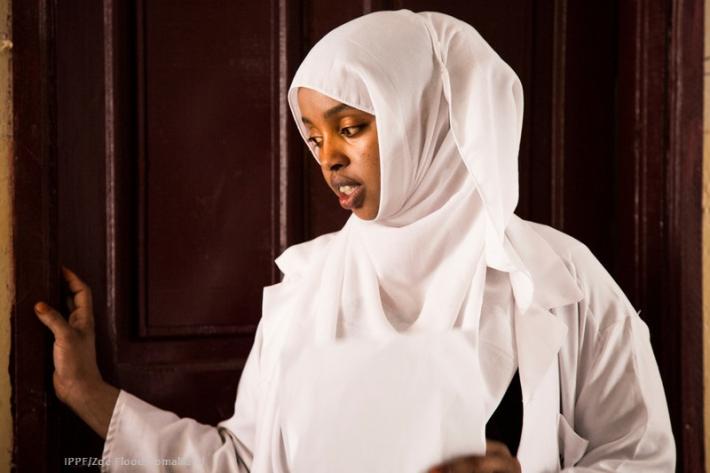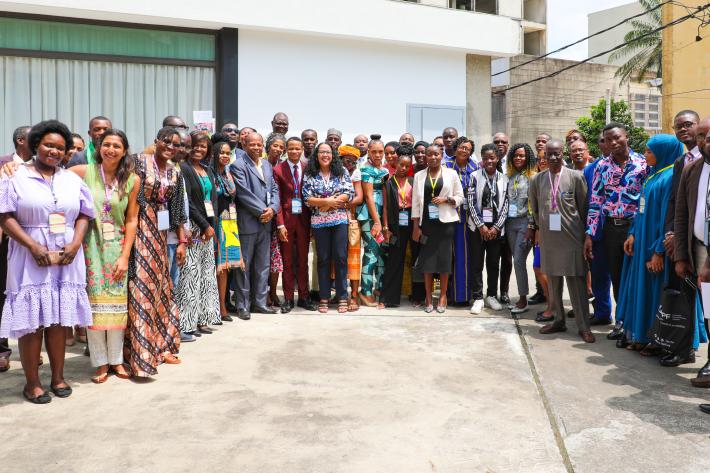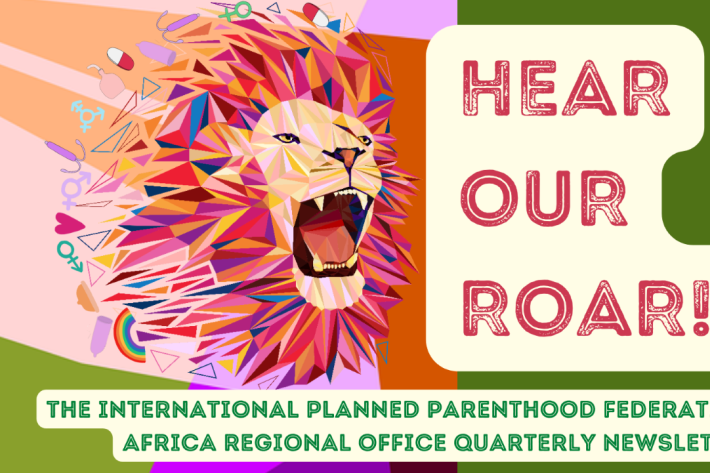
Spotlight
A selection of news from across the Federation

Africa
IPPF Africa Region is seeking talented individuals to support its work
In alignment with its strategy, the IPPF Africa Regional Office is hiring for multiple positions based in Kenya and Côte d'Ivoire.
Filter our news by:


| 28 October 2022
Côte d'Ivoire hosts IPPF Member Associations from West and Central Africa for the launch of the new IPPF sub-office for the sub-region
The International Planned Parenthood Federation (IPPF) Africa regional office gathered from 17 to 22 October in Abidjan, the Executive Directors and Presidents of the Youth Action Movements (YAMs) of its Member Associations in West and Central Africa (Francophone, Anglophone and Lusophone) as part of the launch of its new sub-office for West and Central Africa. With this anchoring in the sub-region, IPPF wishes on the one hand to get closer to its Member Associations (MAs) and Collaborative Partners (CPs), while providing them with more sustained technical support, and on the other hand to create strategic alliances with a view to amplifying advocacy around key issues relating to women's and youth rights and more specifically, their sexual and reproductive health and rights (SRHR). In her introductory speech, IPPF Africa Regional Director Marie Evelyne Petrus-Barry wished that "...the Federation would grow to better influence public policies and reach areas where sexual and reproductive health services are not being met". She also insisted on the effective involvement of young people in the work of the Federation and its Member Associations in accordance with the new strategic framework: "We want this workshop to be a real opportunity for you as young people to express your desires and hopes for your sub-region, for your Member Associations and for IPPF more broadly”. During the four-day workshop, the thirty-six (36) representatives of the 18 Member Associations from West and Central Africa discussed and developed an action plan to materialize IPPF's new vision articulated around the objectives of the new strategic framework over the period 2023-2028 with a particular focus on advocacy issues. In particular, participants explored a common understanding of advocacy as a word and as an action, the status of advocacy in the draft strategic framework and how it aligns with the advocacy work already being done at country level. In this regard, Dr AKU Abubakar, Executive Director of Planned Parenthood Federation of Nigeria, said that "Advocacy is an essential part of our work; without advocacy, it would be difficult to carry out our programmes". The action plan resulting from this meeting will thus contribute to strengthening the synergy between IPPF member associations and consolidate their joint advocacy initiatives for women's access to adapted and diversified sexual and reproductive health services. The workshop was also an opportunity for the representatives of the Youth Action Movement (YAM) to advocate for capacity building of young people so that they can better contribute to the provision of quality SRHR services to marginalized populations. "Young people play a role as facilitators of Comprehensive Sexuality Education (CSE), peer educators on Sexual and Reproductive Health (SRH) at the community level to change unfavourable norms, beliefs and traditions," said Aliu IDRISSU, YAM President of Ghana. A session was also devoted to the strategic and logistical preparation of the next IPPF General Assembly in Bogota, Colombia next November in which all participants are expected to participate. According to Comlan Christian AGBOZO, Executive Director of the Beninese Association for Family Welfare, "this workshop was a good opportunity for the Executive Directors to interact and share experiences after a long period of distant contacts linked to COVID 19. I congratulate the IPPF team for this initiative to set up a sub-office in West Africa, which brings the administration closer to the people, so that our concerns can be quickly taken into account”. The four-day workshop ended on a very festive note with an evening of official launch of the new sub-office with artistic and cultural performances. On this occasion, Richard ALLO, Executive Director of the ‘Association Ivoirienne pour le Bien Être Familial (AIBEF)’, on behalf of all the executive directors present, expressed his gratitude and his team's joy at receiving the new sub-office on Ivorian soil. "As an Ivorian, I am very proud that my country has been chosen to host the sub-office and I hope that this new presence will help us to step up our efforts in the provision of sexual and reproductive health services”. Joyce Rosie AYONG, President of the Youth Action Movement of Cameroon also thanked the initiative on behalf of all the young people present: "We thank the IPPF team for these four days of very enriching workshops. Talking about youth issues with youth representatives is the best way to involve young people in decision-making about youth”. The new IPPF sub-office for West and Central Africa is located at Angre 9eme tranche, near the CGK building, BP: 06 BPM 2575 ABIDJAN 06, Abidjan - Côte D'Ivoire

| 07 July 2022
IPPF Africa Region Quarterly Newsletter - July to September 2022
Quarterly Newsletter - July to September 2022. Click on the image above to read.
| 19 October 2022
IPPF Africa Region Quarterly Newsletter- July-September 2022
Quarterly Newsletter, July - September 2022. Click on the image above to read.

| 08 February 2022
Ghana offers free long-term contraception in a ‘game changer’ for women’s reproductive health rights
In a major win for women’s reproductive rights, Ghana’s National Health Insurance Program has expanded to include free long-term contraception from 1 January 2022. The move will allow millions of women of reproductive age who are already covered by national health insurance to avoid paying out of pocket for family planning methods such as the implant, coil and injections. It comes after a two-year pilot study found that including family planning services in health benefits packages resulted in a greater uptake of long-term contraception and future government savings in direct care costs. “We are excited that at long last, long-term family planning methods are included in the National Health Insurance Scheme,” said Abena Adubea Amoah, the Executive Director of the Planned Parenthood of Ghana (PPAG), an IPPF Member Association. “This means long time peace of mind for women, girls and their families with potential positive impact on their health and economic life.” Tackling deep-rooted barriers to healthcare In late 2021, the government of Ghana launched a year-long campaign aimed at raising awareness of and preventing maternal deaths in line with Goal 3: Good Health and Wellbeing of the United Nations Sustainable Development Goals. The role of family planning in reducing preventable maternal death is well documented, with unsafe abortion being one of the leading causes. Yet, Ghana is a country where deep-rooted cultural norms and structural barriers perpetuate poor sexual and reproductive health, including high risks of maternal mortality, high numbers of sexually transmitted infections and low levels of contraceptive use. Despite making important progress in recent years, Ghana’s maternal mortality ratio is 308 per 100,000 live births, which is still well above the SDG target of less than 70 deaths per 100,000 live births by 2030. PPAG will play an important role in supporting the government in its campaign to prevent maternal deaths and disabilities. Since 1967, PPAG has provided the people of Ghana with family planning services as well as maternal and child health care, infertility management, and voluntary counselling and testing for sexually transmitted infections including HIV and AIDS. With over 100 staff members, a team of 1,000 volunteers, and 300 peer educators, PPAG is well-positioned to deliver health services and programmes through permanent and mobile clinics in urban and rural communities across the country. The association's Youth Action Team, comprised of over 810 young people, leads a number of educational and awareness-raising activities at 1000 community-based service points across the country. The contraceptive injection, implant, IUD - some of the options on offer to women in Ghana. Image: Reproductive Health Supplies Coalition “The youth of Ghana remain the bedrock of the country’s socio-economic development and a critical force for achieving the Sustainable Development Goals alongside the African Union Agenda 2063,” said Ishmael Selassie, PPAG’s Youth Programmes Manager. “The recent move by the government of Ghana to make contraceptives and related services covered by the national health insurance scheme is a game changer. The youth of this country, especially the poor, vulnerable and adolescent girls can hopefully live a healthy sexual life with the assurance of unhindered access to family planning and contraceptive services.” Expanded, free access to long-term contraception is also a progressive step towards the global goal of Universal Health Coverage by 2030 – a framework that allows all individuals and communities to receive the health services and care they need without suffering financial hardship. Reaching women through community-based services Still, nearly half (3.7 million) of an estimated 7.7 million women of reproductive age in Ghana do not have health insurance and family planning services may continue to be unaffordable for many. Inequitable distribution of health care facilities across the country means that many women in rural communities do not have access to lifesaving family planning and other sexual and reproductive health care services. Reaching these women through community-based services, and encouraging them to sign up to the newly expanded health insurance program will be crucial in ensuring the government reaches its goal of zero tolerance for maternal deaths and disabilities by 2030. To support these efforts, PPAG deploys trained community volunteers to provide information, education and selected family planning services in their local communities. Emmanuel Akoto, the director of Programmes and Service Delivery at PPAG, said these volunteers play an important role in delivering contraceptives to the ‘doorsteps’ of those in need. “They serve as a link between their community and health facilities within their localities, complementing the efforts of health care providers by creating demand and making referrals for sexual and reproductive health services,” he said. “This concept is very important because it is community-owned, devoid of stigmatization, cost effective and sustainable.” As an established leader in Sub-Saharan Africa in providing health benefits packages paid for by the government, Ghana may serve as an example to other countries looking to expand universal health coverage by providing reliable family planning services for millions of women around the world. For more updates on our work, follow IPPF Africa Region on Facebook, Twitter, Instagram and You Tube.

| 08 February 2022
What price for a world free from Female Genital Mutilation?
By Marie-Evelyne Patrus-Barry and Anush Aghabalyan COVID-19 continues to disrupt the delivery of essential health services in 90% of countries globally. The Orchid Project, a UK charity working globally to end to female genital mutilation/cutting (FGM/C), further substantiated that soon after the implementation of lockdown measures, reports emerged confirming that the rates of FGM/C were on the rise. While prevention efforts were on track to avert 46.5 million cases of FGM, experts are now predicting that the delays being caused by the COVID-19 pandemic will reduce anticipated progress toward ending FGM by 33%. According to a joint report by UNICEF and UNFPA, an estimated 2 million additional girls are at risk of being cut over the next decade, bringing the total number of girls at risk to 70 million by 2030. These horrific figures are simply unacceptable. Before COVID-19 slowed down progress in eliminating FGM/C, the Sustainable Development Goals target 5.3.2 to end female genital cutting by 2030 was already an ambitious commitment. Rhetoric was simply not matched with financial commitments, and this was only exacerbated by the COVID-19 pandemic. Only $95 is required to avert one single case of FGM/C and to protect a girls' right to health, to bodily integrity, to freedom from violence and to enjoy her sexuality. A relatively small price to pay which pales in comparison with global spending on increasing militarisation (almost $2 trillion per year) and growth based on exploitation of natural resources. By investing $2.4 billion by 2030 we could end FGM/C all together in 31 priority countries. Yet only $275 million is available - or just $4 per girl at risk - leaving a funding gap of >$2.1 billion. Girls and women who have undergone FGM/C live predominately in sub-Saharan Africa and the Arab States, but FGM is also practiced in select countries in Asia, Eastern Europe and Latin America. Only two countries in Asia currently report national data on FGM/C prevalence. This includes Indonesia, where 15 million girls alone will undergo the practice by 2030. The true scale of women and girls affected by FGM/C in the remaining 11 countries across the region where the practice takes place remains unknown. In Africa, more girls are cut between 0 and 14 years of age than any other age bracket. Prevalence rates range from 15% to over 95% of girls and women aged 15 to 49 years, with select countries in the Central and Western Africa regions accounting for a large part of the figures. Investing in girls and women is a central part of the recently adopted African Union Strategy for Gender Equality & Women’s Empowerment as well as Africa’s Transformative Agenda 2063, which, under Aspiration 6, calls for ending all forms of gender based violence, including FGM/C. IPPFAR, through its Sub Office at the African Union, advocates and galvanises political action to accelerate the elimination of FGM/C on the continent. Furthermore, through awareness and communications campaigns, advocacy, and sensitisation, IPPFAR Member Associations are working to prevent the cutting of more than 50 million girls in Africa under the age of 15 years at risk of being subjected to FGM/C by 2030 if concerted action is not taken now. For example, from 2009 to 2020, IPPF Member Associations in Sudan, Mauritania, Somaliland and Djibouti have sensitized and trained over 500 service providers about FGM/C to support clients affected by FGM/C, over 25,000 school and university students and over 200 decision makers. Similarly, between 2015 and 2019, Orchid Project brought together local grassroots organisations through Knowledge Sharing Workshops; 12 workshops across Kenya, Tanzania, Nigeria, Somaliland and Sierra Leone were held. In Kenya, through engagement in a consortium programme with the Coalition on Violence Against Women (COVAW), S.A.F.E. Kenya and their SAFE Maa and SAFE Samburu teams, Orchid also aims to accelerate an end to the practice within the Maasai and Samburu communities in Kenya. On this Zero Tolerance Day, Orchid Project, supported by the International Planned Parenthood Federation Africa Region (IPPFAR) and other partners, have launched a global call for increased funding to step-up efforts to eliminate this extremely harmful practice by 2030. Through the “What’s the Gap” campaign, grassroots organisations are raising their collective voice to urge governments, foundations, private sector, and other potential donors to urgently increase funding to the FGM/C sector. It is essential for investment to come from different sources - from multilateral donors, philanthropy, and the private sector, in addition to domestic resources committed by national Governments. The campaign also highlights that local community organisations and civil-society groups know best where and what to do, to put an end to FGM/C in communities where incidents are more prevalent. Thus, the increased funding would help inform and train key stakeholders, commission research, facilitate more workshops to raise awareness of men and boys, create safe spaces for young survivors and provide alternative occupations and training for cutters. As the COVID-19 pandemic continues, restricting girls’ access to school and limiting access to sexual and reproductive health services, there is great urgency for global investment in ending the harmful practice of FGM/C if we are to reach zero incidences by 2030. Let’s all fight together and commit to closing the funding gap! Marie-Evelyne Petrus-Barry is the Regional Director of the International Planned Parenthood Federation Africa Region (IPPFAR); Anush Aghabalyan is the Head of Policy and Advocacy at the Orchid Project. —-------------------------------------------------------------------------------------------- Commemorated every year on 6 February, the International Day of Zero Tolerance for Female Genital Mutilation aims to amplify and direct efforts on the elimination of the harmful practice. This year’s theme is: Accelerating Investment to End Female Genital Mutilation — investing in programmes to provide services and response for those affected and those at risk and in developing and enforcing laws and fortifying institutional capacity to address eradicating female genital mutilation.

| 08 February 2022
SAAF funding: Grants for organisations working on abortion
The IPPF hosted Safe Abortion Action Fund (SAAF) is accepting funding applications from organizations in low- and middle-income countries working on any aspect of abortion care, research, education, and advocacy. Please note that only organizations on the list of eligible countries are able to apply. Applications can be sent in English, French or Spanish using the online form and funding guidance on our website. Get your application in before 20 February 2022! https://saafund.org/apply-for-funding Hosted by IPPF, SAAF provides small grants to locally-run organizations that promote safe abortion and prevent unsafe abortion through advocacy and awareness-raising, service delivery, and research activities, and has supported such projects for over a decade. SAAF Supports projects run by IPPF Member Associations as well as other organizations not affiliated with IPPF. For more information about the fund visit the SAAF website www.saafund.org.











